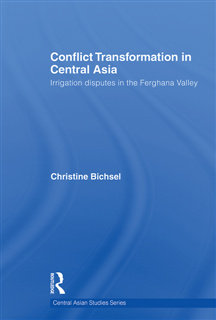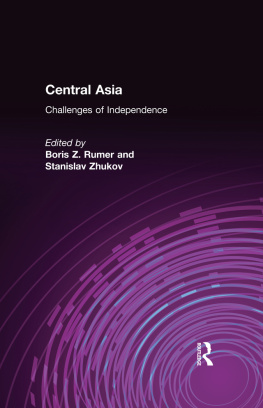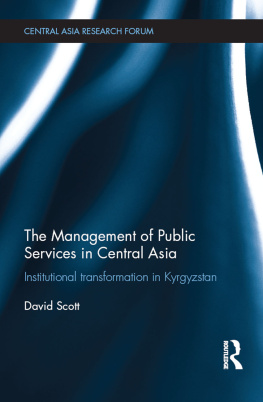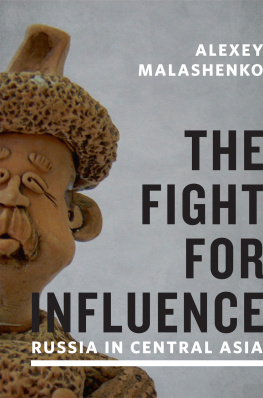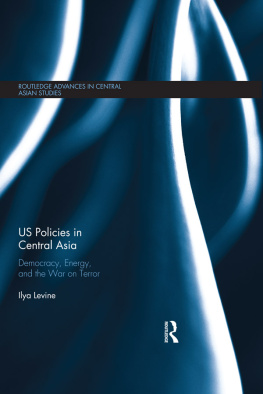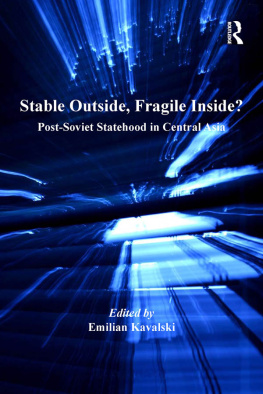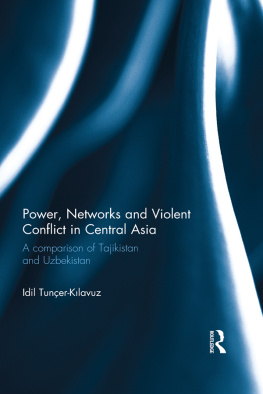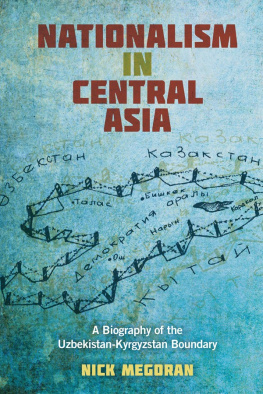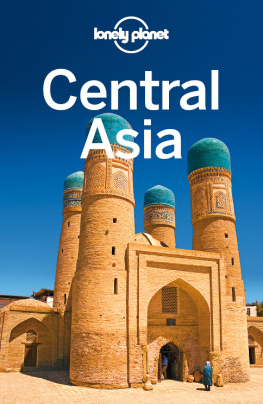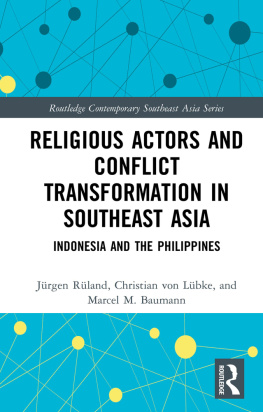Abbreviations
ACTED Agency for Technical Cooperation and Development
AO autonomous region
ASSR autonomous national republic
CAIP Community Action Investment Program
CBO community-based organisation
CIG Community Initiative Group
DWR Department of Water Resources
ENCOP Environment and Conflict Project
EWS Early Warning System
FSK former state and collective farms
FTI Foundation for Tolerance International
GTZ German Technical Cooperation
IG Initiative Group
IMU Islamic Movement of Uzbekistan
IWRM Integrated Water Resource Management
LARC Legal Advice to Rural Citizens
NGO non-governmental organisation
OSCE Organisation for Security and Co-operation in Europe
PC Parity Commission
PCI Peaceful Communities Initiative
PDC Preventive Development Component
PDP Preventive Development Programme
PRA Participatory Rural Appraisal
RDD Regional Dialogue and Development
RRDP Rehabilitation, Reconstruction and Development Programme
RSFSR Russian Soviet Federation of Socialist Republics
SDC Swiss Agency for Development and Cooperation
SSR Soviet Socialist Republic
UN United Nations
UNDP United Nations Development Programme
UNICEF United Nations International Childrens Emergency Fund
USAID United States Agency for International Development
USSR Union of Soviet Socialist Republics
WUA Water User Association
Acknowledgements
In writing this book I have enjoyed the support of many individuals and institutions. I am first and foremost thankful to those who permitted me to study their lived experiences in Kyrgyzstan, Uzbekistan and Tajikistan. Numerous persons have received me with extraordinary hospitality, kindly hosted me during my visits, allowed me to take part in their lives freely and generously shared their insights with me. Special thanks also go to representatives of the Swiss Agency for Development and Cooperation, the United Nations Development Programme and Mercy Corps who have offered access to their projects freely, granted interviews and supported me in this study. In particular, I am indebted to Christoph Lang, Emil Kalmatov, Irene Leibundgut, John Strickland and Dieter von Blarer for their generous support and kind reception of my research.
Funding for the original PhD thesis which laid the foundations for this book was provided by the Swiss National Centre of Competence in Research (NCCR) North-South: Research Partnerships for Mitigating Syndromes of Global Change. The NCCR North-South programme is co-funded by the Swiss National Science Foundation and the Swiss Agency for Development and Cooperation. During my time as a doctoral student, swisspeace offered me a supportive and motivating environment. Later, the Division for Social and Political Geography and Gender Studies at the University of Berne integrated me into the team and supported me in the continuation of my work. A research grant from the Swiss National Science Foundation provided time and funding to rework the thesis into this book. The Department of Geography at the National University of Singapore which hosted me as a postdoctoral fellow during this period offered an inspiring and intellectually challenging environment to bring this project to completion. The support of all these institutions is gratefully acknowledged.
I am grateful to my thesis supervisors Urs Wiesmann and Laurent Goetschel for their intellectual support and continued confidence in my research. Special thanks also go to Doris Wastl-Walter. She has taken a keen interest in my work and kindly supported its continuation into this book. I am much indebted to Eva Ludi who has encouraged and supported me throughout the difficult initial stage of this project. I also thank Madeleine Reeves for her moral and intellectual support during troubled times in the Ferghana Valley, and our many inspiring
Acknowledgements xi
conversations both during field research and later. I owe gratitude to Judith Beyer, Nathalie Gasser, John Heathershaw, Tobias Hagmann, Silvia Hostettler Agnieszka Joniak, Simon Mason, Madeleine Reeves, Cordula Reimann and Balz Strasser for reading and commenting on draft chapters or sections of this book. Their insightful and informed comments helped me shape its argument. Equally, I thank Jeff Sahadeo for reading through the final version of this text. All shortcomings, errors and mistakes remain, of course, entirely my own responsibility.
I owe gratitude to Natalia Korosteliova, Mira Arynova and Ulan Kasymov of the NCCR-North-South Regional Coordination Office in Central Asia for their invaluable logistic, thematic and linguistic assistance. I thank Nazima Islamova for her kind support during my stays in Tashkent. I am also indebted to the GTZ Batken, particularly to Gerald Gunther and Torsten Swoboda. Gerald Gunther has greatly facilitated the beginning of my field research in Batken province, helped me with administrative and logistic problems and shared his extensive experience in development practice. I am equally grateful to Guzel and Torsten Swoboda for the many inspiring conversations on development aid and local politics, their hospitality on Sunday afternoons in Batken town, their companionship and moral and culinary support. A later assignment to GTZ Batken as a consultant provided the opportunity for further research, and has at the same time enabled me to deepen my understanding of the subject of this book. I thank the staff of GTZ Batken for the many conversations that have significantly contributed to my insights on this theme.
I am deeply indebted to the family who repeatedly hosted me in Batken over a period of two years. I thank the late Saadat Eje, Guar Eje, Kubat, Chynara, Jipara, Murat, and Barchynai for having accepted me as a guest in their family, provided space for me to feel at home and let me share their family life. I owe gratitude to Almagul Aisarieva, Emir Kulov, Usubaly Primkulov, and Asylgul Seitbekova who figured as research assistants, accompanied me in my field research, helped me establish contact with my interlocutors, assisted me with translation of interviews in Kyrgyz and Uzbek, and greatly aided my interpretation of what I learned. I enjoyed their companionship and enormously benefited from their support. Very special thanks go to Kubanychbek Satiev and Okil Ochildiev for their invaluable help, advice and friendship.
Thanks go to Emmanuel Heierle, Christian Hergarten, Christoph Hosli, Muhammad Rahiz, and Omar Meshale for support with maps and photographs, and to Reto Weyermann and Marlene Thibault for assistance with translation of Russian texts. I am indebted to Anne Zimmermann for her encouragement, and kind support and advice in editorial and cartographic matters. I also thank Dorothea Schaefter and the editorial staff at Routledge for guiding the manuscript through the review and the production process. I gratefully acknowledge the critical but constructive comments on the manuscript by three anonymous reviewers. Their suggestions have greatly helped me to rework the argument of the original manuscript.
I am most grateful to my parents, my grandmothers, my sister and my brother for their enduring support, encouragement and care. Finally, Jurg Krebs has lived
with this project for a long time. His love and care enabled me to complete it, while he has always reminded me that the world is not inside books, but out there. It is to him that I dedicate this book.
The book incorporates material that appeared in the following article: In Search of Harmony: Repairing Infrastructure and Social Relations in the Ferghana Valley, Central Asian Survey, vol. 24, no. 1 (2005): 53-66.
Appendix
Overview of aid agencies and projects
Regional Dialogue and Development
The Swiss Agency for Development and Cooperation (SDC) implemented the Regional Dialogue and Development Project in the Ferghana Valley (RDD) over the period of 2002-2006. SDC is a governmental aid agency to coordinate international development activities of Switzerland. Switzerland has engaged in bilateral development aid to Central Asia since 1993 (Fust and Syz 2002: 12). RDD was designed as a regional project which should prevent conflict and improve regional cooperation in the border areas of all three countries -Kyrgyzstan, Uzbekistan and Tajikistan - in the Ferghana Valley.1 It built on former SDC activities consisting of two pilot projects: the Kyrgyz-Tajik Conflict Prevention Project and the Rehabilitation of Social Infrastructure Project, the latter implemented by UNDPs Rehabilitation, Reconstruction and Development Programme (RRDP). These two pilot projects operated in Kyrgyzstan and Tajikistan since 1999. In addition, SDC had built up a mediation network of eminent persons named Ambassadors of Goodwill Network in these two countries. In 2002, these three project lines were merged into the present RDD project, and SDCs regional focus was extended to Uzbekistan (SDC 2002).
Next page
